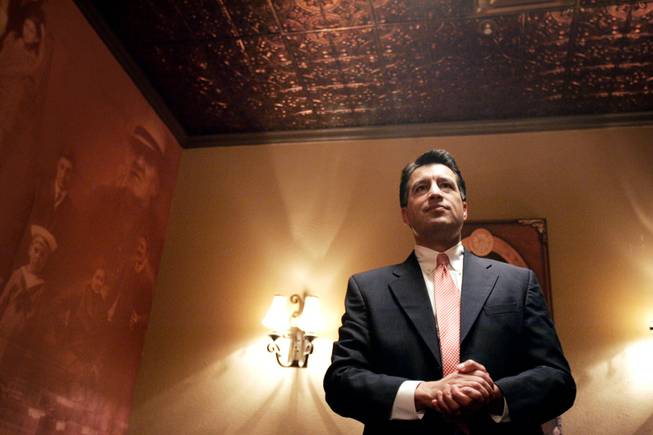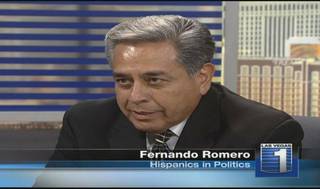
GOP gubernatorial candidate Brian Sandoval speaks with volunteers and supporters earlier this year at the Bootlegger Bistro in Las Vegas.
Sunday, Feb. 7, 2010 | 2 a.m.
Lasting Impression?

Viewing video requires the latest version of Adobe's Flash Player
Sun Archives
- In opposing Sotomayor, is GOP risking the Hispanic vote? (8-7-2009)
- Las Vegans react to Sotomayor confirmation (8-6-2009)
- Senate confirms Sotomayor for Supreme Court (8-6-2009)
- GOP: Ensign affair hurt efforts to field Reid opponent (8-5-2009)
- Ensign to oppose Sotomayor 'to protect the sanctity of Constitution' (8-4-2009)
When Republican Party leaders engaged last summer in a vitriolic attack on then-Supreme Court nominee Sonia Sotomayor, calling her a “racist” and a member of the “Latino KKK” and questioning her credentials despite her elite schooling, it seemed to be a final nail, driven home with gusto, into the coffin of GOP outreach to Hispanic voters.
It was a swift and dramatic alienation from the fastest growing bloc of voters in the entire electorate.
President George W. Bush won at least 40 percent of the Hispanic vote in 2004 with the help of his conservative social policies, his support of immigration reform, and his abiding popularity in the heavily Hispanic Texas and his occasional use of the Spanish language.
But after the charged rhetoric of the immigration reform fight, which the Republican base loudly hated, President Barack Obama won Nevada Hispanic voters by a 3-1 margin in 2008 while also pushing up their turnout considerably — Hispanic voters comprised 15 percent of the Nevada electorate, compared with 10 percent in 2004, according to data compiled by the Pew Hispanic Center.
The sleeping giant of Nevada politics finally woke up, to crushing effect for Republicans.
This year, however, there are hopeful signs for Nevada Republicans among Hispanics, a reflection of the failure of Democrats to advance Hispanic agenda items such as health care and immigration reform.
Just as important, the Republicans have an attractive Hispanic candidate for governor — Brian Sandoval — who could win those votes, according to political scientists, pollsters and even Democratic operatives. They say Sandoval faces some challenges among Hispanic voters — his party, his positions and his not being bilingual — but still say that if he puts resources and care and attention into Hispanic households, he could appeal to these voters.
“You nominate someone like this — a moderate Republican Latino ... who is not saying the crazy anti-immigrant stuff, in this environment, where Latinos could be wondering what the Democrats have done for them, and yes, he does have the ability to peel away votes,” said Matt Barreto, a University of Washington political scientist who studies Hispanic voter trends.
Andres Ramirez, senior vice president of the Washington-based progressive group NDN who doubles as a Nevada Democratic operative, admitted as much: “He’s an attractive candidate, and he has been supportive of Hispanics, and if he is true to his word and champions Hispanic issues, yeah, he’ll be able to peel off some voters.”
In a phone interview, Sandoval, a former Nevada assemblyman and attorney general, said, “I’ve always reached out to the Hispanic community and am proud to have their support regardless of party.”
Sandoval was somewhat circumspect about the entire conversation around Hispanic voters, and rejected the notion that a person’s racial or ethnic heritage would dictate his or her views or political program.
“With regard to Latinos or Hispanics, the issues that are important to them are important to everybody — education for their kids, the size and scope of government. They, like everybody, will look at a candidate and decide who best represents their views and who can identify with them and their concerns.”
He’s not entirely correct about which issues are important, according to Barreto, whose firm Latino Decisions has polled extensively here and elsewhere.
Like nearly all Americans, Hispanics are concerned with jobs and the economy, but Barreto said their legislative focus is on immigration reform and health care — more Hispanics are uninsured than any other group.
This is precisely why Democrats could be in trouble with this now vital part of their coalition. Health care reform is in peril, and Democrats have shied away from immigration reform since 2008’s landslide. Those failures — which have not gone unnoticed — combined with an economy that has hammered Hispanics, could severely dampen turnout among Hispanic voters.
“It’s a big problem,” said a Democratic operative, who was granted anonymity to speak freely about the party’s travails. “There could be some Latino voters who think, ‘I’m supposed to elect them to do nothing? To sit there and be scared?’ ”
Ramirez said Hispanics will again comprise at least 15 percent of the Nevada electorate and said Democrats would make the case that Republicans had blocked their efforts at change and reform at every step.
The argument on immigration won’t be an easy one to make, given that Senate Democrats, led by Harry Reid, have yet to offer any reform plan.
Reid is in a tough re-election fight, and his son Rory Reid would be Sandoval’s opponent if Sandoval can win the GOP nomination. Resentment about a failure to move on immigration could trickle down to the younger Reid.
First, Sandoval, who stepped down from the federal bench to run, must get nominated in a Republican primary that will be dominated, as Ramirez noted, by hard-core conservatives.
“The Republican base has been hostile to Hispanics,” Ramirez said.
Though surely after the primary Sandoval would like to pivot toward Hispanic voters, most of whom are Democrats or unaffiliated, he’ll have to thread a political needle because on one of their most important issues — immigration reform — he has cleaved to the Republican base and its favored position: No path to citizenship for illegal immigrants, now or ever.
Sandoval said he formed no opinion during the immigration reform debates of 2006 and 2007, as it would have been improper because he was a federal judge at the time.
The Sun sent a follow-up e-mail to his campaign, asking about a path to citizenship for illegal immigrants. His press secretary Mary-Sarah Kinner said Sandoval does not favor that approach. With tighter border control and stepped up enforcement on employers who knowingly hire undocumented workers, the problem would subside, Kinner said.
The Pew Hispanic Center estimated there were 11 million illegal immigrants in 2006, a number that may have fallen somewhat due to the recession.
Advocates of the Sandoval approach believe those millions would grow frustrated with their search for work and return to their native countries.
Opponents of this approach fear they would instead turn to crime and other activities of America’s vast and untaxed underground economy.
His position is just one of several problems he’ll have with Hispanic voters, however.
Barreto noted when Nevada Hispanics were asked in 2008, “Which political party do you think has more concern for the Latino community?” a paltry 7 percent of Hispanics said Republican, so low that it was just outside the margin of error.
Ramirez said Democrats would remind voters that Republicans approved a primary plank at their 2006 state party convention to deny citizenship to children born in the U.S. to illegal immigrants. Some Republicans commonly refer to these children derisively as “anchor babies.”
Aside from his party, Sandoval has another potential problem, although his supporters would say it’s a sign of a good upbringing: His parents, who are native-born Americans, insisted on an English-only home because they wanted to avoid being stigmatized.
Sandoval studied Spanish in high school and has picked up bits and pieces from family outings and can often understand what’s being said, but for the most part, he can’t speak Spanish, he acknowledged sheepishly.
Democrats, who have had obvious success with Hispanic outreach, say that makes a difference, and political scientists agree.
“I’m the first to tell people that to succeed you need to learn English, but by the same token we’ve gotten people out to vote by speaking directly to them in their native language,” said Ruben Kihuen, an immigrant assemblyman and a candidate for state Senate.
Democrats note that Rory Reid served a Mormon mission in Argentina and speaks Spanish well, having given several interviews to Spanish-language media since the campaign began.
Still, Sandoval can connect with Hispanic voters, said Luis Valera, a lobbyist for UNLV who once ran for the Assembly as a Republican but left the party over the rhetoric on immigration. He said Sandoval has a narrative that Hispanics can connect with, having overcome racism in 1970s-era Northern Nevada and winding up in the highest reaches of American life.
In the Sun interview, Sandoval didn’t mention facing slurs or discrimination, which Valera said he didn’t find surprising given what he described as Sandoval’s stoicism.
Sandoval said he has had a unique vantage point from which to view immigration, having both sworn in new Americans and faced illegal immigrants in his courtroom.
“One of the things I enjoyed most was the naturalization ceremonies. You see a large group of people who immigrated here legally, learned the language, learned the Constitution. You hear their struggles and hopes. It was a proud moment,” he said.
With the rigors of the campaign — and its attendant ugliness — quickly defining Sandoval’s days, he surely misses those moments.
CORRECTION: This story was changed to remove a reference to Ruben Kihuen being the first Nevada immigrant assemblyman. | (February 7, 2010)



Join the Discussion:
Check this out for a full explanation of our conversion to the LiveFyre commenting system and instructions on how to sign up for an account.
Full comments policy